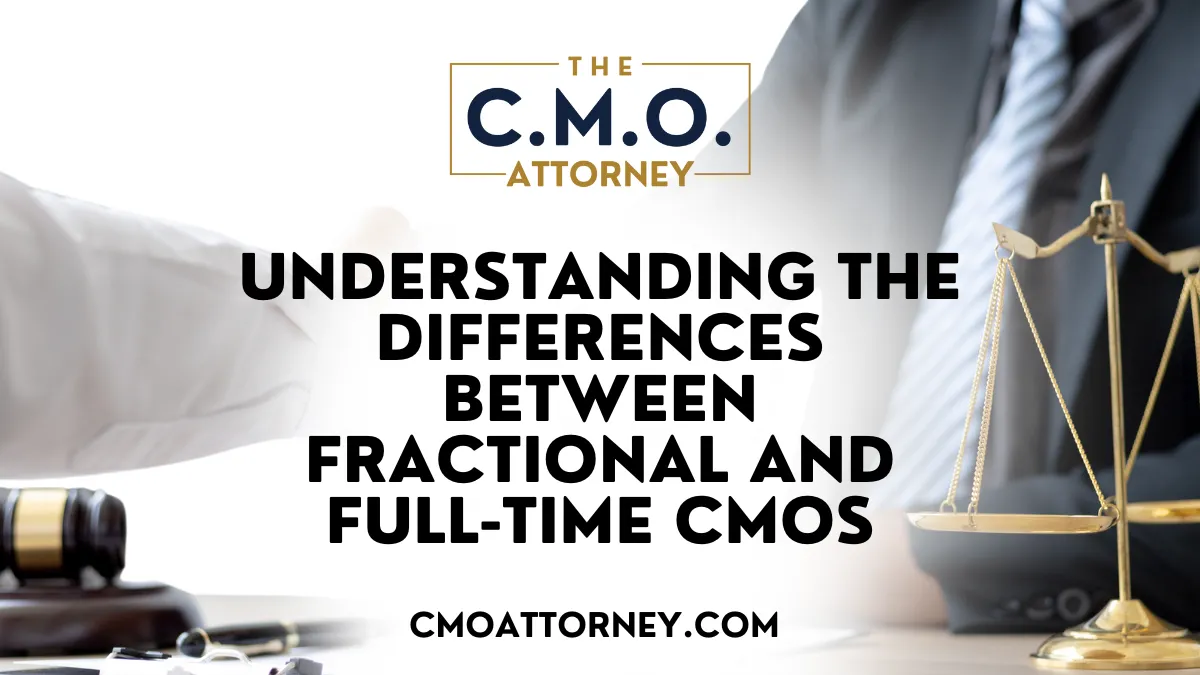 Table Of Contents:
Table Of Contents:
- Understanding Fractional CMOs and Full-Time CMOs
- Key Differences in Employment Models
- Financial Comparisons
- Financial Comparisons
- Impact on Business Strategy
- Short-Term vs Long-Term Outcomes
- Making the Right Choice for Your Organization
- Conclusion
A bold, clear statement: Many law firms struggle to determine the best marketing leadership structure for their needs. Understanding the differences between fractional and full-time CMOs is key to making an informed choice. This article will explore several key points, including employment models and financial comparisons, to shed light on how each option impacts business strategy. By reading this content, law firms will gain insights to identify the most suitable marketing approach and effectively address their unique challenges, ultimately enhancing their law firm marketing strategy. The CMO Attorney wants you to be educated on the role of fractional CMO – so let’s get started, but if you’re ready – we’re here for a free consultation of your firm’s marketing plan and growth strategy!
Understanding Fractional CMOs and Full-Time CMOs
Fractional CMOs are expert marketing professionals who work part-time or on a contract basis, offering strategic insight and consultation to businesses often seeking cost-effective solutions. In contrast, full-time CMOs oversee comprehensive marketing strategies within organizations, particularly in industries requiring consistent oversight. Common sectors for fractional CMOs include startups and small firms, while full-time CMOs are prevalent in larger enterprises. Skill sets for fractional CMOs encompass strong lead generation capabilities and expertise in sustainable development, ensuring they meet diverse customer needs such as marketing ideas for law firms.
Defining the Role of a Fractional CMO
A fractional Chief Marketing Officer (CMO) plays a crucial role in guiding businesses toward strategic marketing decisions that enhance return on investment. By assessing the unique needs of the organization and its target audience, a fractional CMO can craft tailored strategies that drive revenue and incorporate effective law firm marketing strategy and marketing ideas for law firms while maximizing available resources. Their part-time involvement allows law firms and other small businesses to access high-level marketing expertise without the financial commitment of a full-time hire, providing an essential consultation.
In the context of legal services, a fractional CMO focuses on developing effective marketing tactics for law firm marketing strategy that resonate with potential clients. They bring insight into market trends and customer preferences, ensuring each campaign aligns with the firm’s objectives. This strategic guidance, including marketing ideas for law firms, not only strengthens brand positioning but also supports sustainable growth by efficiently allocating marketing resources, ultimately leading to increased profitability.
Defining the Role of a Full-Time CMO
A full-time Chief Marketing Officer (CMO) plays an integral role in shaping a firm’s comprehensive law firm marketing strategy while ensuring consistent execution across all channels. Typically employed by larger organizations, these professionals draw a substantial salary reflective of their full-time commitment and the extensive expertise required. They manage various functions, including team leadership, the integration of automation technology, and the alignment of marketing efforts with the overall business model, creating a cohesive approach that drives growth and brand recognition. Companies often seek consultation to develop effective marketing ideas for law firms.
In addition to overseeing daily operations, a full-time CMO addresses the long-term vision of the firm by adapting to market trends and evolving consumer needs. By leveraging insights gained from extensive market research and consultation, they implement strategic initiatives that enhance client engagement and retention through a robust law firm marketing strategy. This level of involvement allows for proactive adjustments to marketing campaigns, incorporating innovative marketing ideas for law firms, ensuring the business remains competitive in an ever-changing environment, ultimately benefiting employees and stakeholders alike.
Common Industries Utilizing Fractional CMOs
Fractional CMOs are particularly valuable in industries such as technology startups, healthcare, and personal services, where marketing demands may fluctuate and budgets are often constrained. These sectors benefit from the expertise of fractional CMOs to improve brand awareness, enhance the “about us” section, and develop targeted newsletters that engage clients. By hiring fractional CMOs, these businesses gain access to significant knowledge in areas such as search engine optimization and consultation, which is crucial for establishing a strong online presence.
Another area seeing an increasing reliance on fractional CMOs is the legal industry. Law firms can use their services to align marketing strategies with business goals without committing to a full-time salary. This approach enhances understanding of market dynamics while facilitating the development of comprehensive campaigns that resonate with potential clients, ultimately leading to better results in lead generation and client retention by choosing a fractional CMO.
Common Industries Relying on Full-Time CMOs
Industries such as finance, healthcare, and technology often rely heavily on full-time Chief Marketing Officers due to the complexity and scale of their marketing needs. These sectors benefit from continuous oversight provided by full-time CMOs, enabling consistent integration of marketing automation tools. Their expertise helps organizations craft and execute comprehensive marketing strategies aligned with overarching business goals, ensuring that marketing initiatives effectively resonate with target audiences.
Moreover, companies in consumer goods and retail sectors utilize full-time CMOs to maintain brand consistency and adapt to market trends swiftly. The fractional CMO cost is not a feasible option for many larger organizations, which require ongoing direction and strategic vision. By having a dedicated CMO, these businesses can foster a cohesive marketing environment, facilitate cross-channel campaigns, and navigate the increasing complexity of customer expectations, ultimately leading to enhanced market performance.
Skill Sets Required for Fractional CMOs
Fractional CMOs must possess strong leadership skills to effectively guide marketing teams and initiatives, even in a part-time capacity. Their ability to conduct successful onboarding processes ensures new team members understand their roles and align with the firm’s goals. Furthermore, these experts adeptly analyze the target market, employing strategic planning to identify and address client needs while cultivating meaningful connections.
These professionals are also equipped with an extensive knowledge base that allows them to implement innovative marketing tactics. By leveraging their expertise, fractional CMOs can develop strategies that resonate with potential clients, resulting in improved lead generation and customer engagement. As market dynamics evolve, their agile approach enables law firms to respond promptly, optimizing resources and maximizing returns on marketing investments.
James Frazier | The CMO Attorney
Key Differences in Employment Models
The key differences in employment models between fractional and full-time CMOs are critical for law firms to understand. Fractional CMOs engage on a contractual basis, offering flexibility that aligns with budget constraints while providing strategic leadership. In contrast, full-time CMOs have a structured employment setup, with fixed work hours and a commitment that incurs additional expenses like health insurance. This section will delve into the availability, commitment, and flexibility inherent in both roles, helping firms decide which model best suits their branding and operational needs.
Contractual Engagements of Fractional CMOs
Contractual engagements of fractional CMOs provide law firms with the flexibility to tailor their marketing strategy according to specific needs without the long-term commitment associated with full-time hires. This approach allows firms to allocate resources efficiently, as fractional CMOs can focus on critical projects such as content marketing and digital marketing initiatives. By leveraging analytics, they can assess the effectiveness of these strategies, ensuring that firms maximize their marketing investments while meeting budgetary constraints.
Moreover, fractional CMOs bring a wealth of expertise that aids in bridging gaps often seen in traditional marketing teams. They work collaboratively with other executives, such as the chief financial officer, to align marketing objectives with the firm’s financial goals. This collaborative effort enhances a firm’s overall marketing performance, as fractional CMOs can quickly adjust strategies based on real-time data and market conditions, allowing law firms to remain agile in a competitive landscape.
Employment Structure of Full-Time CMOs
Full-time Chief Marketing Officers (CMOs) operate within a structured employment framework, typically reporting directly to the organization‘s executive leadership. This structure allows for cohesive strategic management of marketing initiatives, ensuring that all efforts align with the firm’s broader business goals. As they work within the corporate landscape, these professionals focus on integrating marketing strategies with overall operations, thereby enhancing the customer experience through consistent brand messaging and engagement.
The employment model of full-time CMOs often entails oversight of various marketing functions, including digital marketing, market research, and brand development. This comprehensive involvement enables them to implement innovative strategies that address the firm’s unique challenges without the need for outsourcing. As full-time employees, they also enjoy direct access to internal resources, allowing for more responsive decision-making and the ability to adapt to changing market conditions effectively.
Work Hours and Availability of Fractional CMOs
Work hours and availability for fractional Chief Marketing Officers (CMOs) provide law firms with a flexible solution tailored to their unique needs. Typically, fractional CMOs structure their hours based on project demands and firm requirements, allowing for a focus on specific marketing campaigns or client engagement efforts without the fixed commitment associated with full-time roles. This adaptability helps law firms optimize their marketing strategies while managing costs effectively.
The part-time nature of fractional CMOs means they can offer their expertise on an as-needed basis, effectively addressing pressing marketing challenges without the burden of a full salary. By strategically aligning their availability with key marketing initiatives, fractional CMOs enhance the execution of campaigns while ensuring that law firms receive informed guidance that aligns with their operational objectives. This tailored approach allows firms to stay responsive to market dynamics, promoting sustainable growth and improved outcomes.
Work Hours and Commitment of Full-Time CMOs
Full-time Chief Marketing Officers (CMOs) typically maintain structured work hours, usually committed to a standard 40-hour workweek. Their consistent availability allows them to engage deeply with their marketing teams, ensuring that all initiatives align with the law firm’s broader business objectives. By integrating marketing strategies with overall operations, they effectively enhance the customer experience and drive meaningful brand engagement.
The commitment level of full-time CMOs extends beyond regular hours, often requiring them to be accessible for strategic discussions and urgent decisions. This dedication ensures responsive oversight of various marketing functions, including digital marketing, market research, and brand development. Their continuous involvement contributes to fostering a cohesive marketing environment, which can ultimately lead to improved client retention and heightened market performance.
Flexibility in Engagement for Businesses
The flexibility provided by fractional Chief Marketing Officers (CMOs) allows businesses to engage expert marketing professionals on an as-needed basis. This adaptability enables firms to tailor their marketing strategies to current demands without the long-term financial commitment associated with full-time hires. For law firms facing periodic fluctuations in their marketing needs, fractional CMOs can step in to drive specific initiatives, such as digital marketing campaigns or lead generation efforts, aligning perfectly with the firm’s immediate objectives.
In contrast, full-time CMOs maintain a consistent presence within an organization, which can limit the ability to pivot quickly in response to changing market conditions. While their dedicated involvement fosters a cohesive approach to marketing strategy, it may not always be cost-effective for smaller firms or those with variable marketing needs. By capitalizing on the unique engagement model of fractional CMOs, businesses can maximize their marketing resources and focus on achieving specific outcomes without unnecessary overhead expenses.
Financial Comparisons
The financial implications of hiring a fractional Chief Marketing Officer (CMO) versus a full-time CMO can significantly impact a law firm’s budgeting and overall strategy. This section explores the cost expectations associated with fractional CMOs, including how they can support short-term goals, while also examining salary expectations for full-time roles that contribute to long-term financial planning. Additionally, insights on return on investment analysis for both models will highlight the strategic advantages available to firms when choosing between these two employment structures.
Cost Implications of Hiring a Fractional CMO
The cost implications of hiring a fractional Chief Marketing Officer (CMO) present a significant advantage for law firms seeking to manage their marketing budgets effectively. Fractional CMOs typically engage on a part-time basis, allowing firms to access high-level marketing expertise without incurring the full salary typically associated with a full-time position. This model not only reduces overhead expenses but also provides flexibility to allocate resources toward specific projects, enhancing the impact of the firm’s marketing strategies.
By hiring a fractional CMO, law firms can strategically navigate their marketing needs without the commitments tied to full-time employment. This approach allows for cost-effective solutions that align with immediate promotional goals, ensuring firms maximize their return on investment. Moreover, fractional CMOs can tailor their contributions to the firm’s existing capabilities, allowing for efficient integration of marketing tactics that resonate with prospective clients without stretching financial resources too thin.
Salary Expectations for Full-Time CMOs
Full-time Chief Marketing Officers (CMOs) typically command salaries that reflect their comprehensive responsibilities and expertise. These professionals often earn between $150,000 to over $300,000 annually, depending on factors such as the size of the firm, geographical location, and their level of experience. This financial commitment underscores the integral role they play in driving marketing strategies and connecting them to the firm’s overall business objectives.
Investing in a full-time CMO provides law firms with skilled leadership essential for executing multi-channel marketing initiatives. Their consistent involvement enables deeper market insights and the ability to quickly adapt to changing client expectations. This long-term strategic alignment can significantly enhance client retention and brand visibility, ultimately contributing to the firm’s growth and profitability over time.
Budgeting for Short-Term Goals With Fractional CMOs
Budgeting for short-term goals with fractional Chief Marketing Officers (CMOs) allows law firms to efficiently allocate their financial resources. These professionals can assess immediate marketing needs and develop targeted strategies that align with specific campaigns, ensuring that expenditures directly contribute to achieving promotional objectives. By focusing on key projects, firms can drive quick results while managing costs effectively.
Moreover, fractional CMOs offer flexibility for law firms looking to experiment with new marketing tactics without the long-term financial commitments of a full-time hire. This approach enables firms to respond swiftly to emerging market trends or seasonal demands, utilizing their budget to maximize lead generation and client engagement. Such strategic budgeting not only enhances short-term results but also lays the groundwork for sustainable growth over time.
Long-Term Financial Planning With Full-Time CMOs
Long-term financial planning with full-time Chief Marketing Officers (CMOs) plays a critical role in enhancing a law firm’s overall marketing effectiveness. By establishing a consistent and strategic approach, full-time CMOs can align marketing efforts with the firm’s business objectives, ensuring that marketing initiatives not only support current client retention but also pave the way for future growth. Their extensive involvement allows for the identification of emerging market trends, enabling proactive adjustments to campaigns that can significantly impact the firm’s profitability over time.
Furthermore, full-time CMOs bring valuable insights that inform budgeting decisions and resource allocation for marketing efforts. With a deep understanding of the firm’s objectives and market position, they can create comprehensive marketing budgets that cater to long-term needs while optimizing return on investment. This structured approach helps law firms manage their financial commitments effectively and ensures that marketing investments contribute directly to achieving strategic goals, fostering sustained growth and enhanced brand presence in a competitive landscape.
Return on Investment Analysis for Both Models
Evaluating the return on investment (ROI) for both fractional and full-time Chief Marketing Officers (CMOs) is essential for law firms aiming to optimize their marketing strategies. Fractional CMOs often provide targeted solutions that can yield quick results with lower upfront costs, making them an appealing choice for firms looking to enhance their marketing efforts without significant financial commitments. Their flexibility allows for focused investments in high-priority projects, which can directly contribute to improved lead generation and client engagement.
Conversely, full-time CMOs represent a long-term investment that can lead to substantial growth over time. By providing continuous oversight and strategic direction, full-time CMOs help firms establish comprehensive marketing plans that deepen market insights and drive consistent results. The financial commitment associated with a full-time position can be justified through sustainable returns, as these professionals are positioned to navigate changing market dynamics and adapt strategies that align with the firm’s goals, ultimately benefiting its bottom line.
Impact on Business Strategy
The impact on business strategy varies significantly between fractional and full-time Chief Marketing Officers (CMOs). Fractional CMOs excel in adaptability, enabling firms to respond quickly to immediate marketing needs. In contrast, full-time CMOs offer a long-term strategic vision that aligns with overarching business goals. This section will also present case studies highlighting successful applications of both CMOs, explore the value of external insights from fractional CMOs, and discuss how full-time CMOs integrate into existing teams effectively.
Short-Term Strategy Adaptability With Fractional CMOs
Fractional CMOs offer law firms a unique advantage in short-term strategy adaptability. Their flexible engagement allows organizations to pivot quickly in response to market changes or urgent marketing needs without the constraints of a full-time commitment. For instance, when a law firm faces a sudden increase in case inquiries after a publicized event, a fractional CMO can swiftly implement targeted marketing initiatives to capitalize on the heightened interest.
This adaptability not only enables quick responses to emerging trends but also enhances the effectiveness of marketing campaigns tailored to immediate firm objectives. By focusing on specific projects, fractional CMOs help ensure that marketing expenditures directly align with current goals, thereby maximizing return on investment. Their expertise allows firms to remain agile, enabling them to navigate the complexities of the legal market with strategic finesse and clarity.
Long-Term Strategic Vision of Full-Time CMOs
Full-time Chief Marketing Officers (CMOs) bring a long-term strategic vision that aligns closely with a law firm’s overarching business objectives. Their continuous presence allows them to develop comprehensive marketing plans that not only address immediate challenges but also foster sustainable growth. For instance, a full-time CMO can initiate a brand positioning strategy that resonates with potential clients over time, ensuring consistent messaging that builds trust and loyalty.
This long-term focus enables full-time CMOs to identify emerging market trends and adjust marketing initiatives proactively. By collaborating with other departments, they can integrate marketing strategies across the firm’s operations, enhancing customer experiences and engagement. Their insights contribute to informed resource allocation, ensuring that marketing investments are optimized to support the firm’s future success and market presence.
Case Studies Highlighting Effectiveness in Different Scenarios
In a recent case study, a mid-sized law firm engaged a fractional Chief Marketing Officer (CMO) to address a sudden increase in personal injury claims triggered by a highly publicized local incident. The fractional CMO implemented a targeted digital marketing strategy that leveraged search engine optimization (SEO) and social media engagement, resulting in a significant uptick in client inquiries within just a few weeks. This scenario highlights how fractional CMOs can quickly adapt to market changes and drive immediate results tailored to specific firm objectives.
Conversely, a large legal firm employed a full-time CMO to develop a comprehensive marketing plan aligned with its long-term goals of expanding into new markets. The full-time CMO conducted extensive market research and collaborated with various departments to integrate marketing efforts, leading to a 30% increase in brand recognition over two years. This example demonstrates the value of having a full-time CMO for crafting and executing a strategic vision that aligns with the firm’s overarching business strategy, ensuring sustained growth and adaptability in a competitive environment.
The Value of External Perspectives From Fractional CMOs
Fractional Chief Marketing Officers (CMOs) offer valuable external perspectives that can significantly enhance a law firm’s marketing strategy. By engaging a fractional CMO, firms gain access to fresh insights and innovative approaches drawn from extensive experience in various industries. This expertise can help law firms identify new market opportunities and adapt their marketing tactics to changing client preferences, ensuring that they remain competitive and relevant in a dynamic landscape.
Moreover, fractional CMOs can provide an objective viewpoint that internal teams may overlook. Their varied experience empowers them to evaluate existing marketing strategies critically and recommend improvements that align with business objectives. For instance, a fractional CMO might analyze the effectiveness of current campaigns and suggest adjustments based on data-driven insights, thereby optimizing the firm’s marketing efforts and enhancing overall performance.
Integrating Full-Time CMOs Into Existing Teams
Integrating a full-time Chief Marketing Officer (CMO) into existing teams necessitates a strategic approach to ensure seamless collaboration and alignment with overall business objectives. Their role involves not only leadership but also fostering a culture of communication and cooperation among departments, which is essential for effective marketing execution. For instance, a full-time CMO can work closely with legal teams to align messaging and branding strategies, enhancing client engagement and promoting a cohesive brand presence in the market.
Moreover, full-time CMOs can leverage their leadership skills to mentor and guide marketing teams, building capabilities that drive sustained growth. This hands-on involvement allows them to assess performance metrics and implement data-driven adjustments to strategies. By actively participating in daily operations, a full-time CMO enhances the firm’s ability to adapt to market shifts, ensuring that every marketing initiative contributes to long-term objectives and budget efficiency.
Short-Term vs Long-Term Outcomes
Fractional CMOs often deliver immediate results by quickly implementing targeted marketing initiatives, while full-time CMOs focus on sustained growth through comprehensive strategies. This section will measure success using key performance indicators, explore how each role contributes to overall business goals, and discuss the transition from fractional to full-time CMOs, providing relevant insights for law firms navigating these distinct employment models.
Immediate Results Driven by Fractional CMOs
Fractional Chief Marketing Officers (CMOs) bring immediate results to law firms by quickly implementing targeted marketing strategies tailored to the firm’s specific needs. Their ability to assess current challenges allows them to develop and execute campaigns that align with pressing business objectives, ensuring timely improvements in lead generation and client engagement. This responsiveness enables law firms to capitalize on fleeting market opportunities, providing a competitive edge in the fast-paced legal landscape.
The expertise of fractional CMOs facilitates rapid adaptations to evolving market conditions, allowing firms to refine their marketing approaches without lengthy deliberation. For example, when a law firm faces an unexpected surge in inquiries due to a local event, a fractional CMO can swiftly deploy effective digital marketing tactics to attract new clients. Such agility in execution benefits firms by maximizing resources and enhancing overall marketing effectiveness, addressing immediate needs while laying the groundwork for future growth.
Sustained Growth From Full-Time CMOs
Full-time Chief Marketing Officers (CMOs) play a critical role in fostering sustained growth for law firms by developing and executing comprehensive marketing strategies that align with long-term business goals. Their continuous presence enables them to monitor market trends, adapt to client feedback, and implement changes that resonate with target audiences. For example, by conducting thorough market research, a full-time CMO can identify emerging opportunities, allowing the firm to stay competitive and relevant in an evolving industry.
The long-term engagement of a full-time CMO creates a cohesive marketing environment that promotes consistent messaging and brand integrity. This dedication facilitates deeper collaboration with various departments within the firm, which enhances the overall client experience. As these professionals lead multi-channel marketing initiatives, they leverage their insights to ensure that every campaign contributes to the firm’s strategic objectives and sustainable growth, ultimately driving increased client retention and market performance.
Measuring Success: Key Performance Indicators
Measuring success through key performance indicators (KPIs) is essential for evaluating the effectiveness of both fractional and full-time Chief Marketing Officers (CMOs). For fractional CMOs, firms often focus on immediate metrics such as lead generation rates and campaign responsiveness, which showcase their ability to deliver quick results in a dynamic environment. These quantifiable outcomes provide law firms with a clear understanding of the short-term impact their marketing investments yield, allowing for timely adjustments to strategies.
In contrast, full-time CMOs concentrate on long-term KPIs that reflect broader business objectives, such as client retention rates and brand recognition over time. By consistently monitoring these indicators, they can assess the sustainability of their marketing initiatives and ensure alignment with overall business goals. This comprehensive approach to success measurement empowers law firms to balance short-term gains with long-term growth, ultimately leading to more strategic decision-making in their marketing efforts.
How Each Role Contributes to Overall Business Goals
Fractional Chief Marketing Officers (CMOs) contribute significantly to a law firm’s immediate objectives by implementing focused marketing strategies that drive short-term results. By leveraging their unique expertise, fractional CMOs can quickly identify market opportunities and execute campaigns that align with current business goals, enhancing lead generation and client engagement. Their flexibility enables law firms to manage costs effectively while achieving substantial improvements in marketing performance without the long-term commitments associated with full-time roles.
In contrast, full-time CMOs concentrate on the long-term growth trajectory of law firms by developing and overseeing comprehensive marketing strategies that support overarching business objectives. They foster continuity in marketing efforts, allowing for consistent brand messaging and deeper market insights that address evolving client needs. This long-term engagement ensures that marketing initiatives not only meet present demands but also establish a strong foundation for future success, ultimately leading to improved client retention and increased market share.
Transitioning From Fractional to Full-Time CMOs
Transitioning from a fractional Chief Marketing Officer (CMO) to a full-time CMO can provide law firms with the consistency and deeper strategic oversight necessary for long-term growth. As firms identify their expanding marketing needs, integrating a full-time CMO allows for continuous evaluation and refinement of marketing initiatives that align with the firm’s broader business goals. This transition enables the organization to leverage the insights gained during the fractional engagement, ensuring that marketing strategies are not only effective in the short term but also sustainable over time.
The move to a full-time CMO role should be based on the positive outcomes seen during the fractional engagement, such as improved client engagement or increased lead generation. By assessing these metrics, law firms can justify the investment in a full-time position, knowing that it strengthens their marketing efforts. This decision facilitates a comprehensive approach, utilizing established campaigns while incorporating new strategies that evolve with market demands, ultimately leading to enhanced brand recognition and client retention.
Making the Right Choice for Your Organization
Assessing business needs is essential when deciding between fractional and full-time Chief Marketing Officers (CMOs). Indicators for hiring a full-time CMO include complex marketing needs that require consistent oversight, while firms may opt for fractional CMOs for flexibility and cost-efficiency. This section will explore how combining both roles can enhance marketing strategies, key factors to consider in the business context, and future trends in CMO engagement strategies.
Assessing Business Needs: When to Choose Fractional CMOs
When evaluating business needs, law firms should consider fractional CMOs as a viable option if they face budget constraints or fluctuating marketing demands. Fractional CMOs provide high-level expertise without the financial burden of a full-time salary, allowing firms to access strategic marketing insights tailored to immediate objectives. For instance, a firm experiencing a surge in case inquiries after a media event can quickly engage a fractional CMO to implement targeted campaigns that capitalize on this increased interest.
Moreover, fractional CMOs are an ideal choice for law firms seeking to test new marketing strategies before committing to long-term investments. Their ability to provide specialized knowledge on specific projects, such as digital marketing or brand positioning, enables firms to adapt their approaches based on real-time results. This flexibility helps firms navigate changing market conditions and optimize marketing efforts, ultimately enhancing lead generation and client engagement while managing costs effectively.
Indicators for Hiring a Full-Time CMO
Law firms should consider hiring a full-time Chief Marketing Officer (CMO) when they encounter complex marketing needs that require ongoing management and strategic oversight. For example, firms experiencing rapid growth or those branching into new practice areas may benefit from the consistent presence and dedicated focus of a full-time CMO. This role facilitates the alignment of marketing strategies with overall business objectives, ensuring that all efforts contribute to long-term growth and success.
Another indicator for hiring a full-time CMO is the need for comprehensive brand management and multi-channel marketing initiatives. Firms that aim to strengthen their market presence or enhance client retention might find that the dedicated expertise of a full-time CMO is crucial for driving these efforts. With a full-time CMO, law firms can establish a cohesive marketing environment that fosters brand loyalty and effectively addresses evolving client demands.
Combining Fractional and Full-Time CMO Roles Effectively
Combining fractional and full-time Chief Marketing Officers (CMOs) can create a robust marketing strategy for law firms looking to optimize their resources. This hybrid approach allows firms to benefit from the immediate, flexible expertise of fractional CMOs for short-term initiatives while leveraging the comprehensive oversight of full-time CMOs for long-term strategic goals. For example, a law firm may engage a fractional CMO to implement a targeted campaign during a peak season while maintaining a full-time CMO to ensure sustained growth and cohesive brand messaging throughout the year.
This collaboration enables law firms to address both immediate marketing needs and broader business objectives simultaneously. The fractional CMO can quickly adapt to changing market conditions, providing specialized knowledge as needed, while the full-time CMO focuses on integrating these efforts into the overall marketing strategy. Such a synergistic relationship not only enhances marketing effectiveness but also supports the firm’s goal of maximizing client engagement and retention over time.
Factors to Consider in a Business Context
When deciding between a fractional and full-time Chief Marketing Officer (CMO), law firms should assess their specific marketing needs and organizational structure. A firm experiencing rapid growth with complex marketing demands may find that a full-time CMO provides the necessary oversight and strategic vision. In contrast, organizations with fluctuating marketing requirements may benefit from the flexibility and cost-effectiveness that fractional CMOs offer, allowing them to scale their marketing efforts as needed without incurring the expenses associated with a full-time hire.
Another key factor to consider is the firm’s long-term goals and how marketing initiatives align with them. Full-time CMOs excel in developing comprehensive strategies that foster brand loyalty and client engagement over time, which is crucial for sustainable growth. On the other hand, fractional CMOs are ideal for implementing targeted campaigns that address immediate challenges, enabling firms to adapt quickly to changing market conditions while still driving measurable results.
Future Trends in CMO Engagement Strategies
As law firms evaluate their marketing strategies, the trend toward hybrid models featuring both fractional and full-time Chief Marketing Officers (CMOs) is gaining traction. This approach allows firms to leverage the immediate tactical expertise of fractional CMOs while maintaining the strategic oversight of full-time professionals. By combining both roles, organizations can optimize their marketing efforts to achieve short-term goals while ensuring long-term adaptability in a competitive landscape.
Moreover, the integration of technology in CMO engagement strategies is becoming increasingly important. Utilizing marketing automation tools and data analytics offers CMOs the ability to monitor campaign performance in real-time, enhancing decision-making processes. Firms that embrace these tools can expect a more agile marketing strategy, allowing them to respond quickly to market changes and client needs, ultimately driving better results.
James Frazier | The CMO Attorney
Conclusion
Understanding the differences between fractional and full-time Chief Marketing Officers (CMOs) is crucial for law firms aiming to optimize their marketing strategies. Fractional CMOs offer flexibility and cost-effectiveness, allowing firms to address immediate needs without long-term commitments, while full-time CMOs provide consistent oversight necessary for sustained growth. Each role brings unique advantages that align with specific organizational goals, making it essential for firms to assess their marketing demands accurately. By strategically choosing the right CMO model, law firms can enhance their market presence and drive better results in client engagement and retention.
Contact a Fractional CMO with The CMO Attorney Today!
Engaging a fractional Chief Marketing Officer (CMO) at The CMO Attorney offers law firms access to expert marketing strategies without the financial commitment of a full-time hire. This approach enhances efficiency, objectivity, and swift implementation of tailored solutions that drive growth and improve brand visibility. By aligning business goals with CMO expertise, firms can capitalize on unique industry insights and optimize their marketing efforts. Embracing these benefits empowers legal practices to navigate a competitive landscape effectively, ensuring sustained success and a strong market presence. Contact us today to schedule your free consultation!
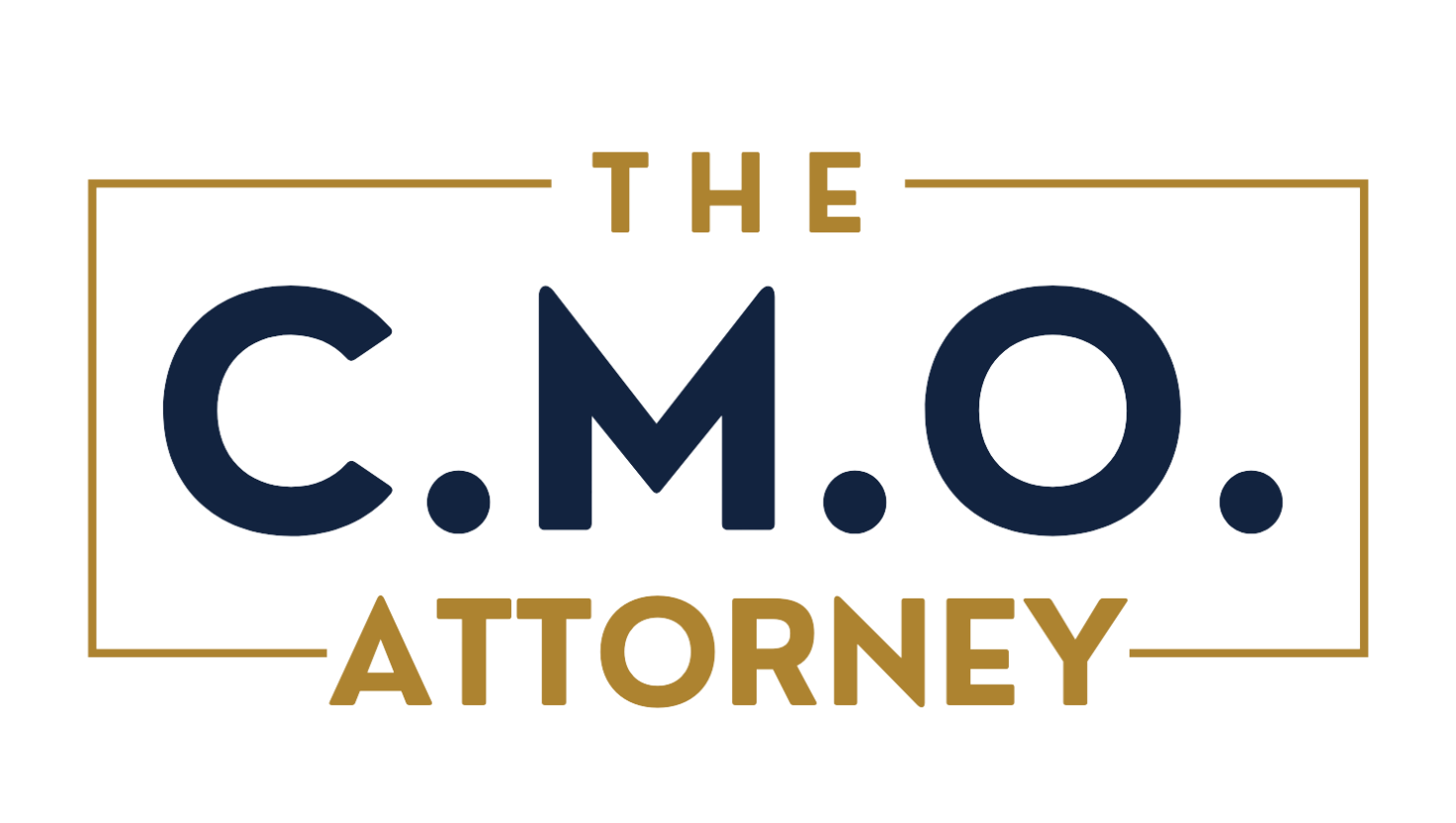


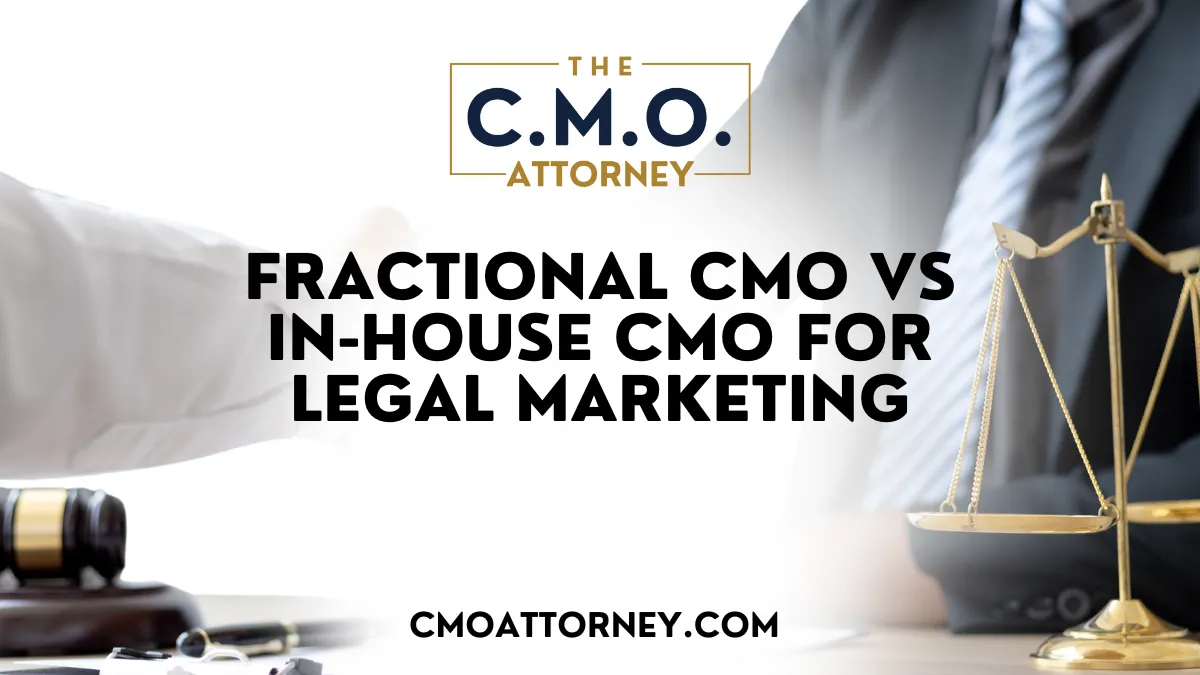 Table Of Contents:
Table Of Contents:
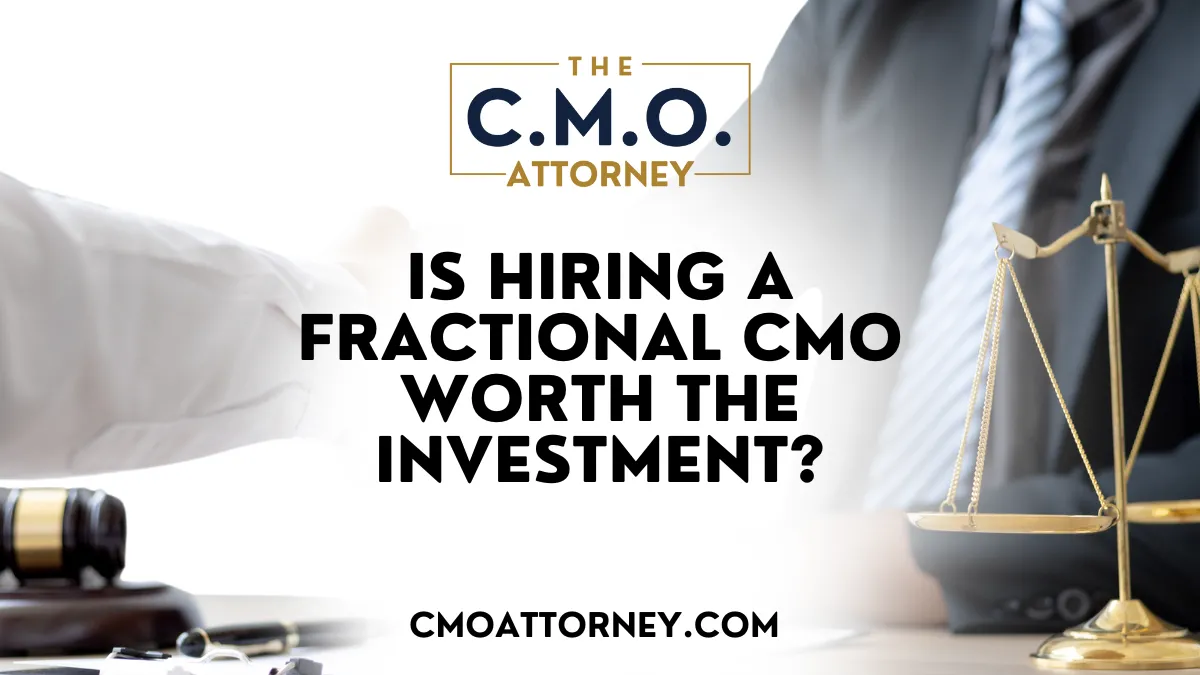 Table Of Contents:
Table Of Contents:
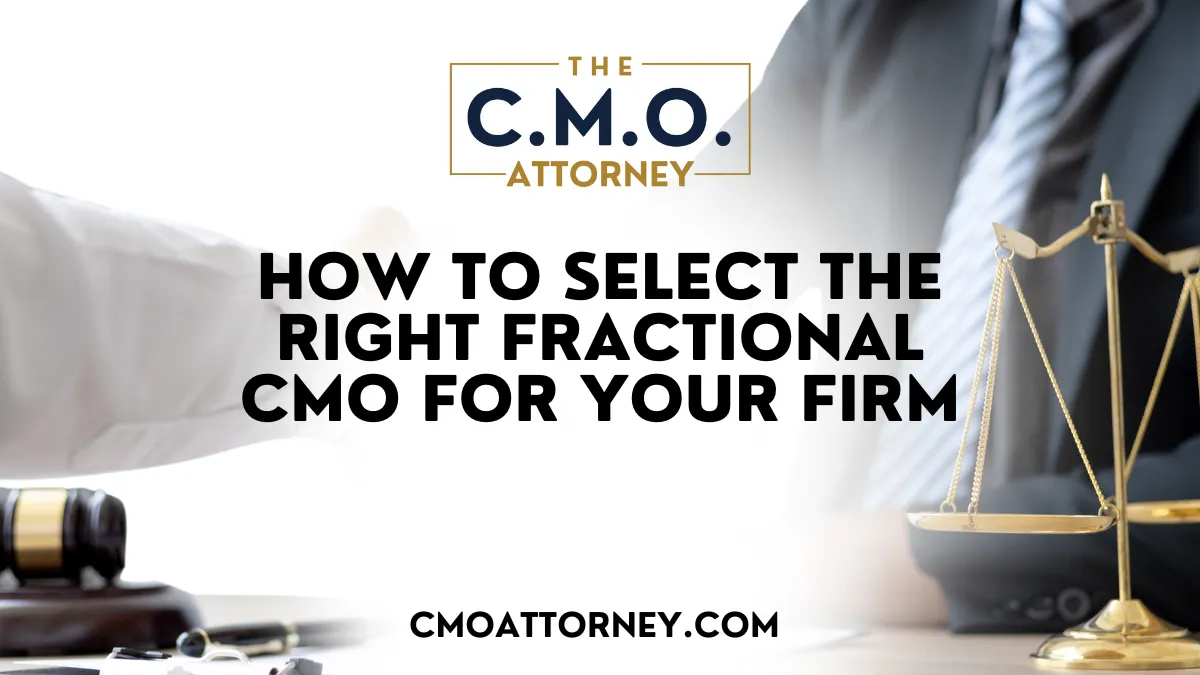 Table Of Contents:
Table Of Contents:
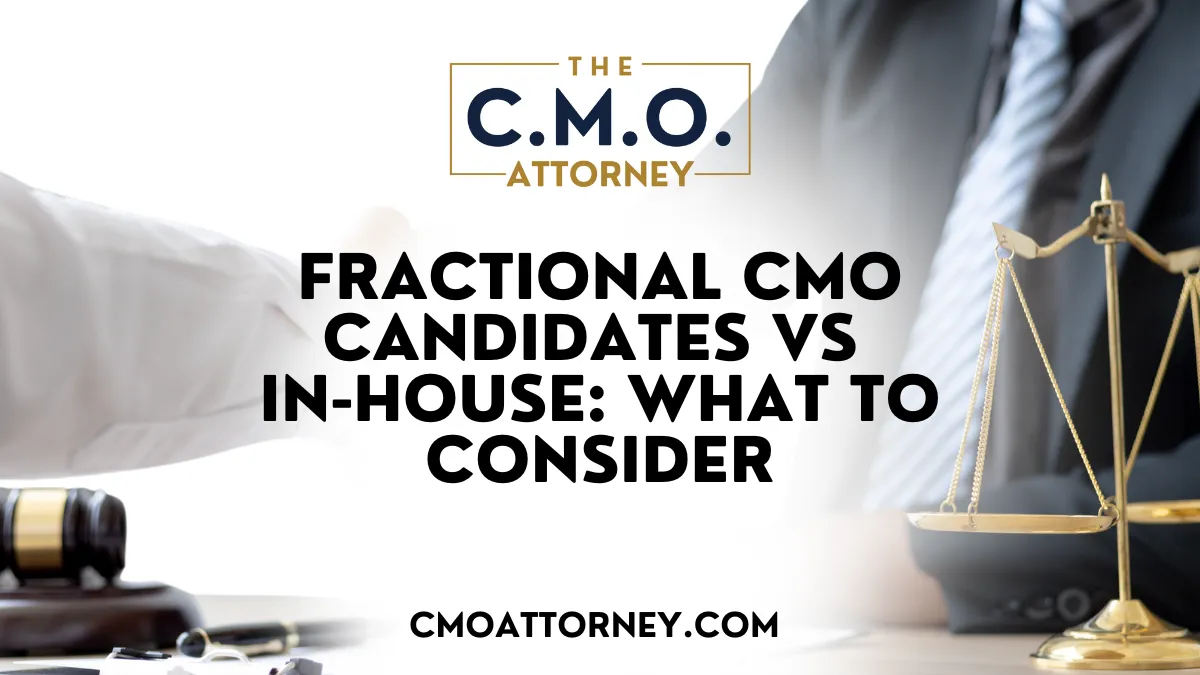 Table Of Contents:
Table Of Contents: